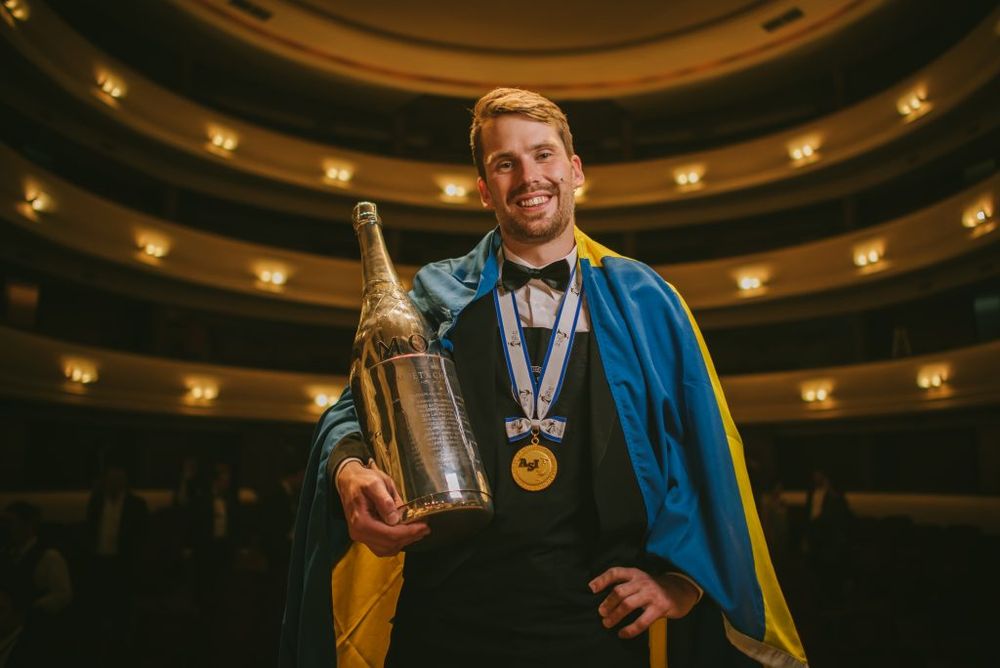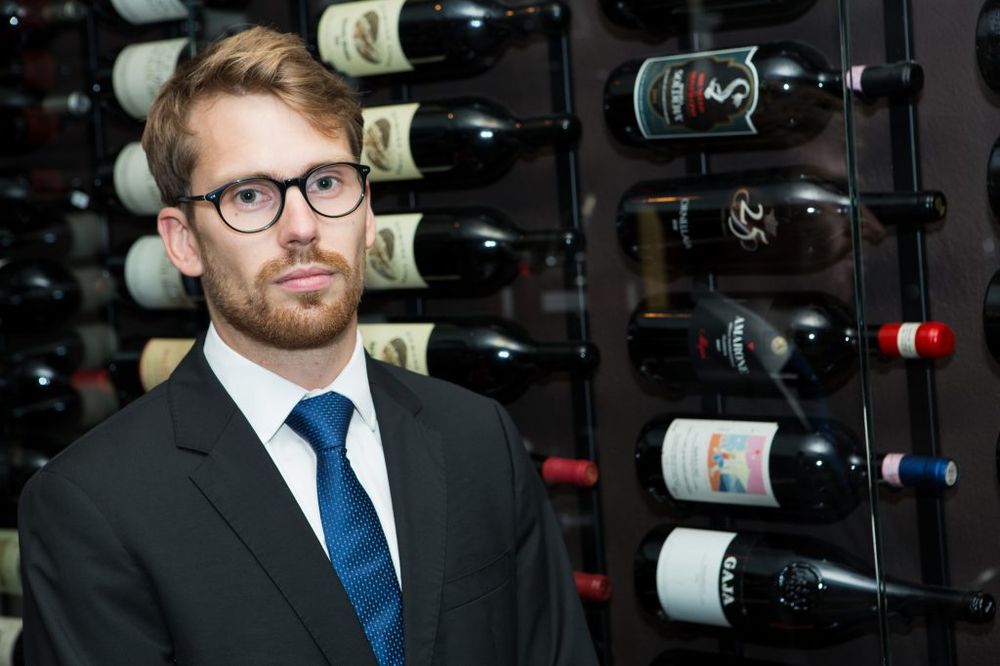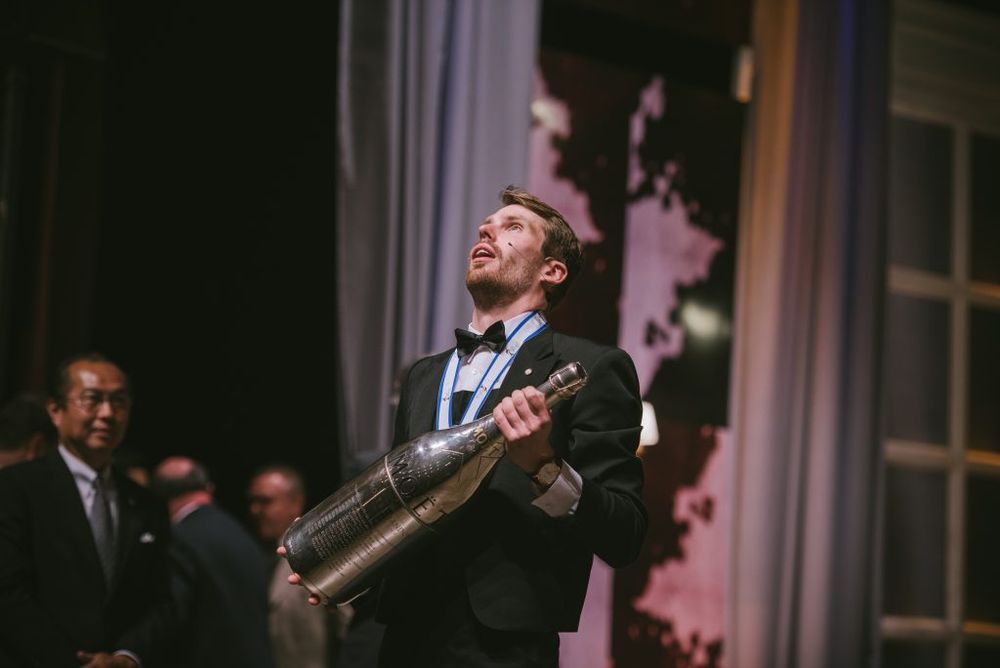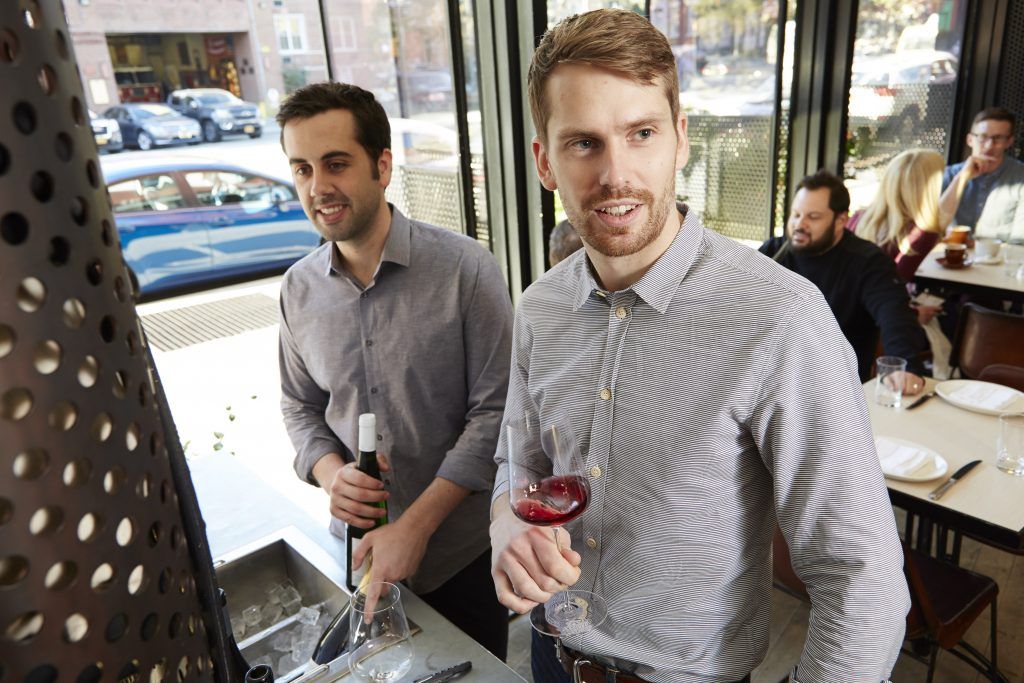In part two of our interview, Arvid Rosengren explains the intense preparation needed to become the Best Sommelier in the World and how it as much about training your mind as it is your palate.

Arvid Rosenberg draped in a Swedish flag on the stage at the final of the Best Sommelier in the World competition
What advice would you give someone entering the Best Sommelier in the World competition?
Make a clear roadmap and plan out your time. How much time do you have, and how do you allocate it? How are you studying is a more important question to ask then how much you’re studying. I worked 80 hour weeks until the day I left for Argentina, so there was no time to waste.
Hence I probably spent a lot less time looking at books every day than most candidates, but I had a clear method that I knew was working, mapped out years ago.
Think about every aspect of the competition and how that relates to your daily life and job. Think about your posture, breathing, speech and other “ticks”, down to the smallest details: I have it down to my exact hand motions when opening and serving bottles, to ensure that it is efficient and elegant.
I do it the same way in the dining room, every day, thousands of times over before the competition.
Make sure the people in your life know what you’re getting into, that it’s going to take a lot of time and presence away for a while, but that it might pay off in the future too.
What do you think the secret to your success was?
All of the above: come prepared! But don’t forget to train your mind too. I meditated every day, did breathing work and saw an improvisation acting coach. All to ensure I could smile and be confident in my preparation once I got on to the stage.
I see too many people who I know are really sympathetic, good sommeliers, who lose it on stage because they are nervous and stressed. It’s a vicious cycle, and you need to break it. I’m happy to say that I was able to do that when it mattered.
How did you train for the spirits element in the world sommelier competition?
Blind taste a whole lot! Or I should say blind nose, because if you start tasting spirits you lose your palate quickly. So I had bartender and sommelier friends pour me long flights, preferably in black glasses, for me to identify.
Getting it right is all about familiarity and mental clarity. My spirits blind tasting game is very dependent on my general mood. If I’m nervous, or tense, I miss things I otherwise wouldn’t have.
How do you decide which wines to buy?
Taste, taste, taste. Naturally, I buy a lot of old wines on auctions and such too, and you have to go with your experience and dig into the provenance a bit more. But for everything else, I want to taste before spending what is essentially, other people’s (my employer and the end consumer; the guest) money.

Rosengren: the best suppliers are the ones that take the trouble to find out what I want
What is the best way for a supplier to approach you?
Take your time to study my list in advance (at Charlie Bird in New York) . Don’t show up saying, “I think this will be a great match for your list” when it clearly isn’t. In fact, the success rate of that sentence is zero percent.
Don’t expect my time to be free, meaning don’t just show up unexpectedly thinking that tasting whatever wine you’re pushing is a good idea. Do come in for dinner once in a while or just for a coffee or a glass of wine in the bar, if nothing else than to keep yourself updated on what we do.
Which styles of wine do you prefer?
I’m an omnivore, I like a lot of things. I value elegance and freshness in wine, and personally consume more white than red. My reds tend to be more on the finesse than power side of things.
How do you see wine styles developing?
There is definitely a trend for more sleek wines, and at least for me it is very welcome, after a period of “more = better”. Perhaps some are taking it too far, but I imagine it will balance out soon.
Which countries will be popular in future?
The classics will live on, but I see a lot of potential in places like north western Spain, Portugal, Greece, the Balkans and virtually all of the southern hemisphere, given that they re-think their production methods and goals (which seems to be happening).
How do you see spirits category?
Wearily. Especially where I am in New York, it is mostly a tedious affair, virtually monopolised by big distributors and brands that couldn’t care less about the consumer. Fortunately there are smaller producers and distributors too that can replace much of it, but there are things that every bar or restaurant needs that you unfortunately can only buy from one purveyor.
What is the most interesting or dynamic spirits trend?
Not sure about dynamic, but I’m excited about fruit distillates. The skill and investment required to make the best of these is not yet reflected in the price of the bottles. Sadly it is virtually unknown to drinkers and even professionals. I wish some great bartenders would start championing these.

The moment: after all those years of training and dedication.
Is wine knowledge more important than spirits for a sommelier?
You need to know a bit of it all, but as a general rule, yes. Spirit sales are not what they used to be, if we’re talking about after dinner digestives, same as for sweet wines. Soo naturally the focus should be on what the guests are looking for.
How you hope to spend the year ahead?
Hopefully with a bit more calm and presence than last year! I hope to read a book or two not concerning esoteric wines or even watch a movie or two. I hope to spend more time with my loved ones, and have some fun too!
Who are your confidantes and other sommeliers you respect and enjoy working with?
I’ve found a great team in New York who share my philosophy of non-fussy but flawless wine service. Grant Reynolds and Robert Bohr whom I currently work with at Charlie Bird (and our consulting business King Street Sommeliers) are two of the best, most knowledgeable and experienced sommeliers I’ve ever worked with.
In the past, I’ve learned a lot from working with Sören Polonius (today at Esperanto, Stockholm), Robert Andersson (Hornstull Bodega, Stockholm) and Christian Jacobsen (Anarki, Copenhagen) – all real hospitality pros!
- You can read the first part of our interview with Rosengren here.
Here’s Rosengren in action at the Best Sommelier in the World finals in Mendoza, Argentina in April. Here he is identifying different types of spirit.
And here is the moment when he was announced as the winner of the competition.































